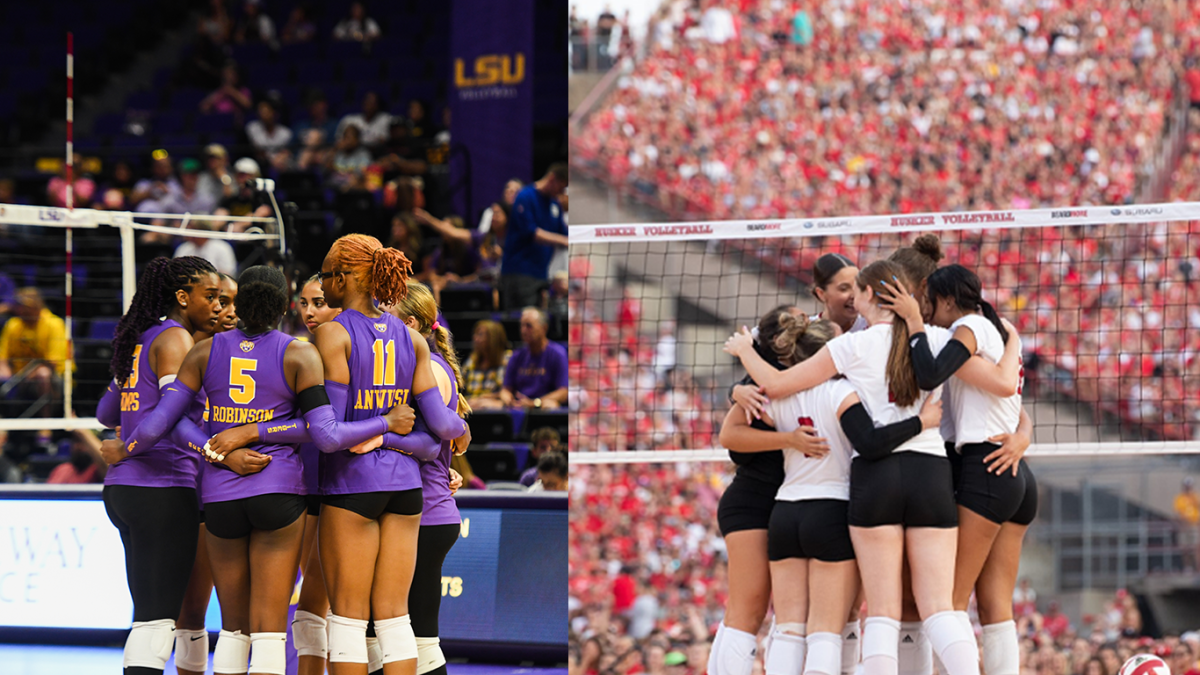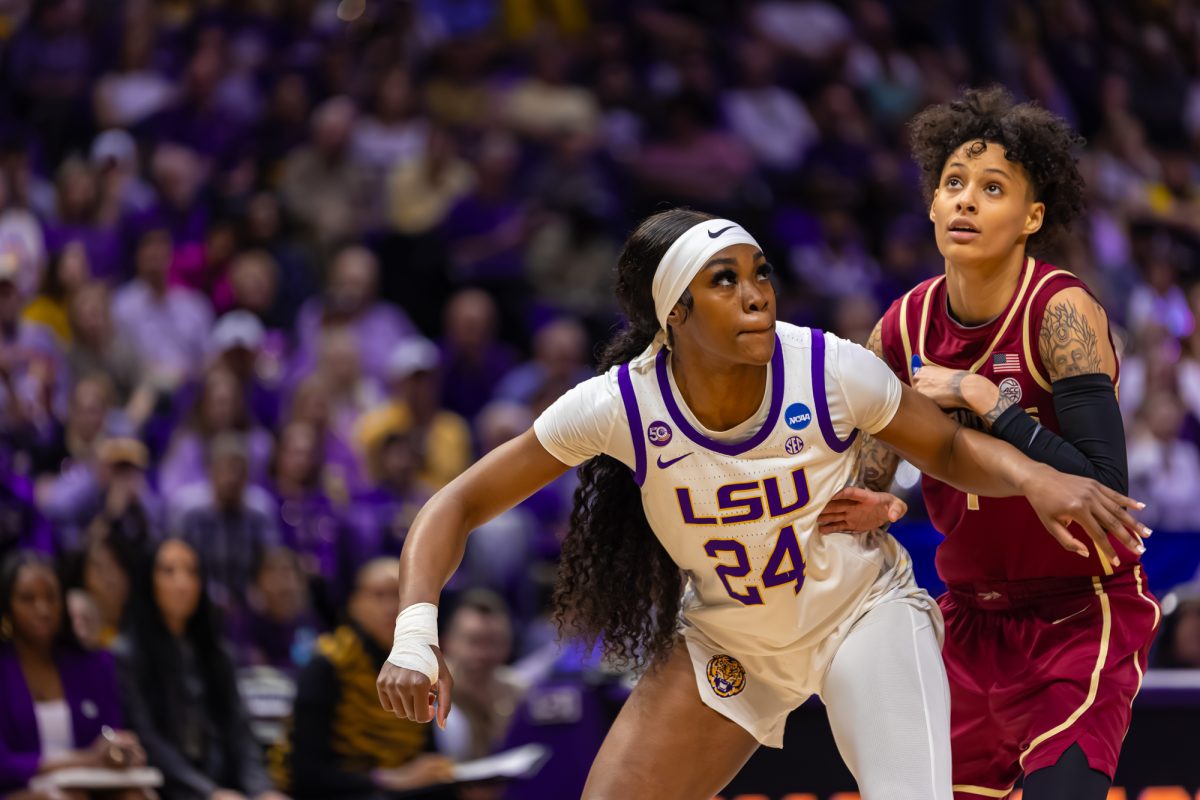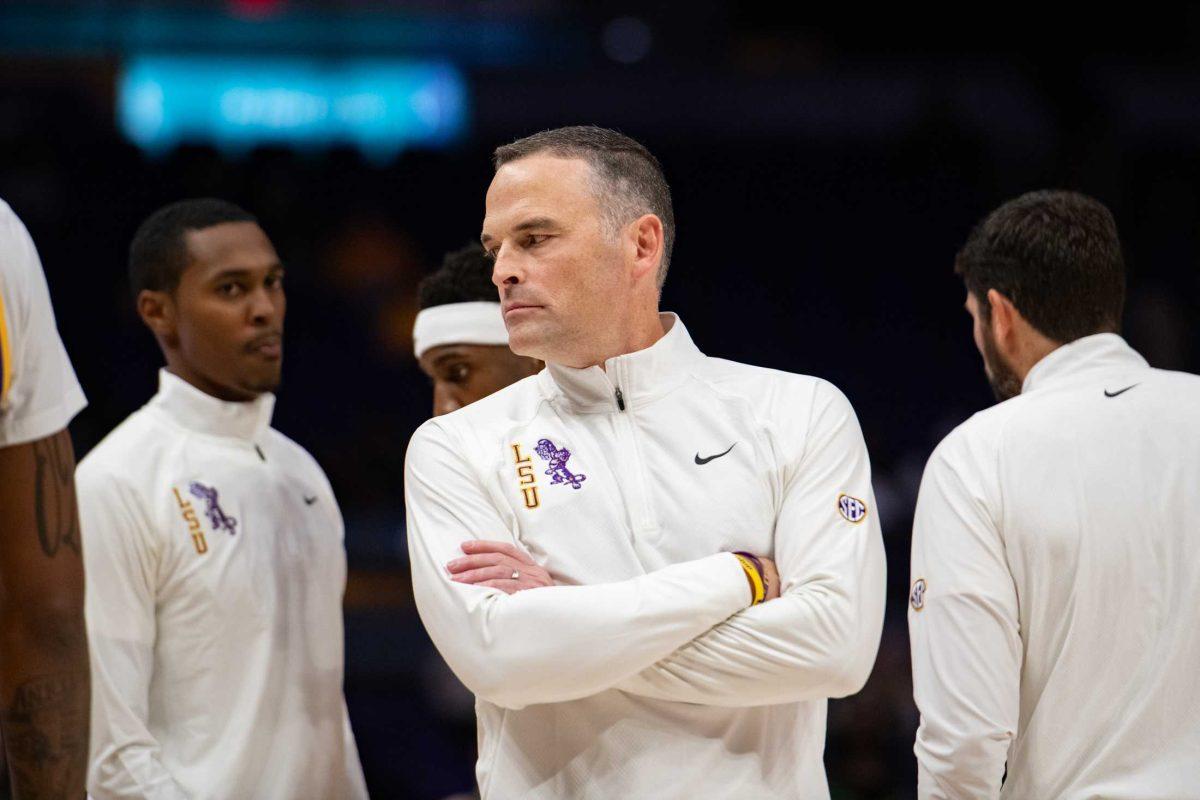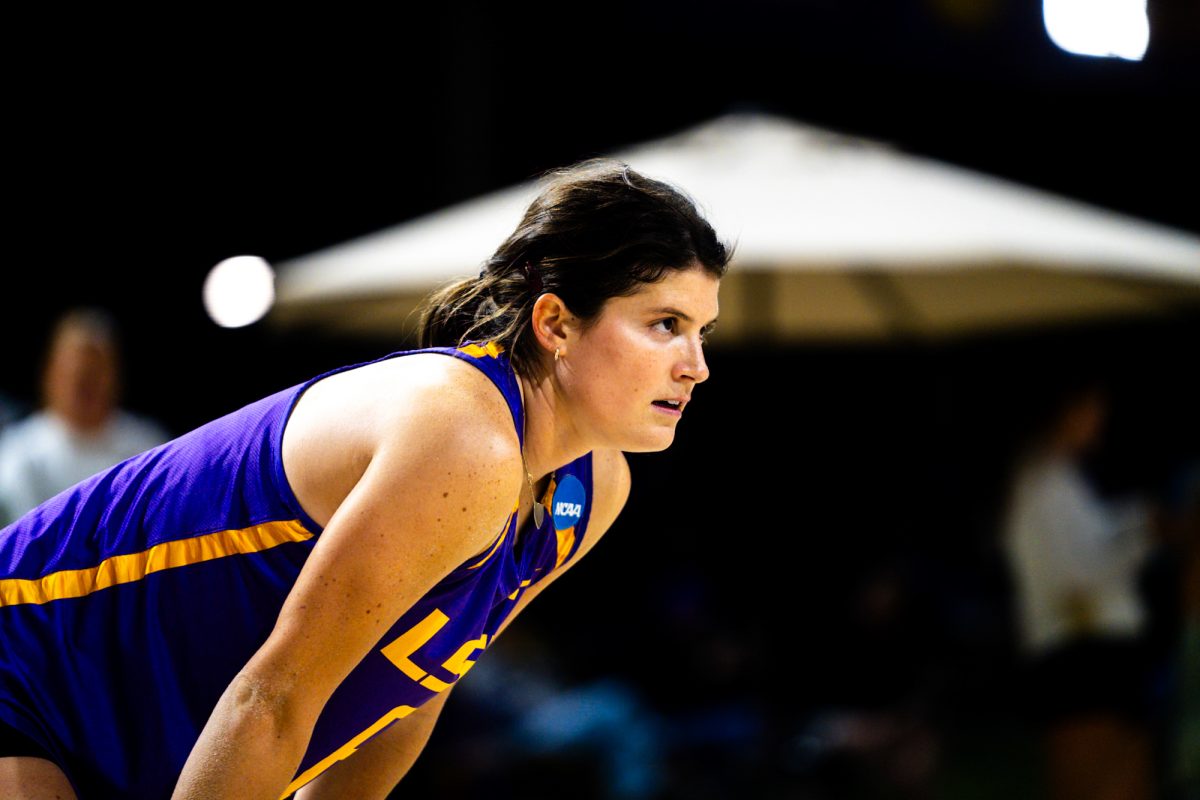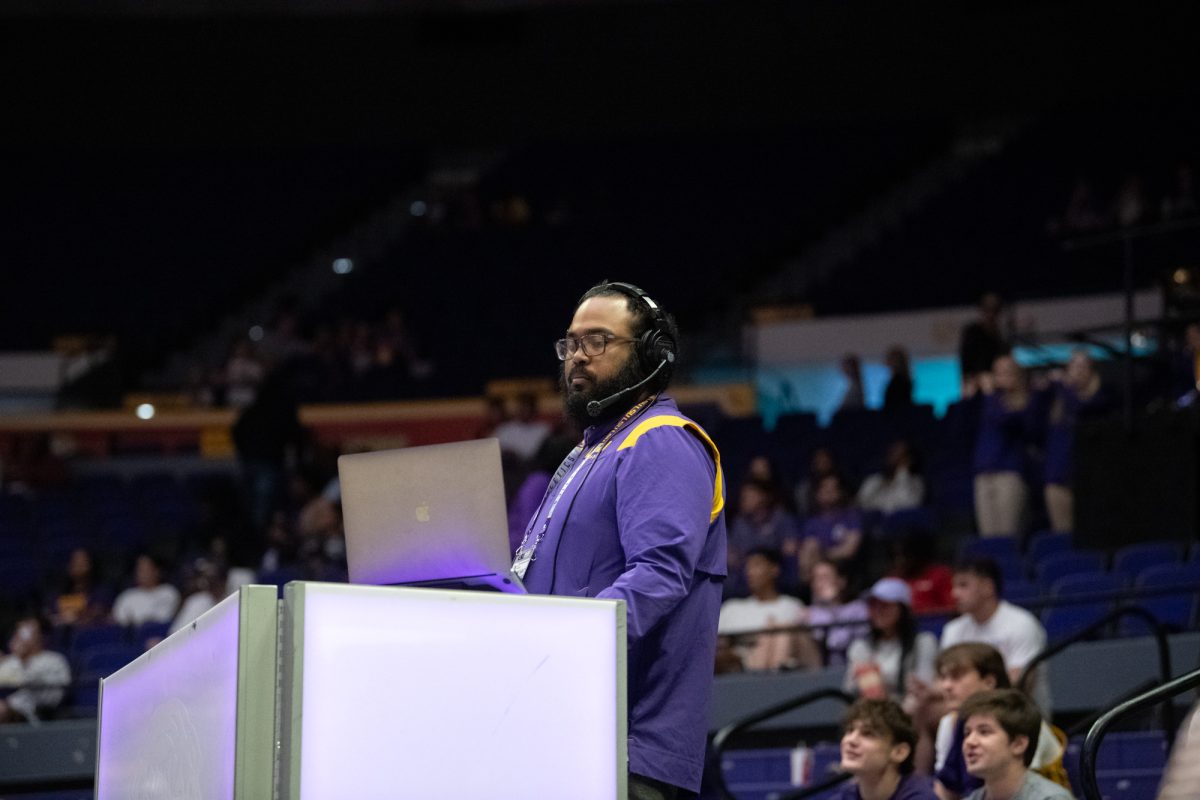The University of Nebraska-Lincoln’s volleyball team set the world attendance record for a women’s sporting event with 92,003 fans at the first-ever volleyball game in a football stadium on Aug. 30, 2023. Meanwhile, LSU volleyball attendance struggles to break 1,000.
Recognized as one of the top athletic schools in the nation when it comes to fan support, it’s almost concerning to see such low attendance records for an LSU sporting event. So, what does Nebraska have that LSU doesn’t?
It isn’t the sporting facility: Nebraska volleyball regularly plays in the Bob Devaney Sports Center, which seats 8,309 for volleyball matches; LSU volleyball regularly plays in the Pete Maravich Assembly Center, which seats 13,125.
It isn’t the amount of success: in 2010, LSU volleyball went 12-1 at home and 25-5 overall but averaged just 892 fans per match.
It’s doubtful that it’s because it’s a women’s sport: LSU women’s basketball set an attendance record in the PMAC during the 2022-23 season and brought in large crowds for every home match.
Kinesiology sophomore Gracie Chen said she knows LSU is a football school, but she’s seen what support can do to a program, attributing much of LSU women’s basketball’s success to the fan support.
Maybe it’s simply because volleyball at LSU lives in the shadow of football.
When asked to name the first three things that come to mind about LSU, computer science sophomore Zahir Giwa immediately said “football,” then followed momentarily after with “tiger” and “sports.”
There are a few reasons Nebraska generates such a large fanbase for a sport outside of the big three (football, basketball and baseball), but a large factor that helped propel Nebraska volleyball to success in its early stages was the already-existing success of the football team.
“Nebraska does not become a major player without a successful football program,” Terry Pettit, who coached Nebraska volleyball from 1977 to 1999, told ESPN. He added that the right resources and conference placement were vital in the emergence of Nebraska volleyball.
So, where does LSU volleyball stack up against the Huskers?
High-end sporting facility? Check.
Successful season? Maybe not in recent years, but there have been more than a handful of successful LSU volleyball seasons. Check.
Support for women’s sports? LSU women’s basketball and gymnastics gather decent crowds. Check.
Powerhouse football team? Check. Check. Check. (Bonus points for the PMAC being right next to Tiger Stadium.)
Sufficient resources? LSU has set aside $28,657,518 in the 2023-24 fiscal year for women’s athletics, according to its operating budget; in other words, if volleyball needs something, LSU could provide it. Check.
Good conference placement? Southeastern Conference volleyball is arguably one of the toughest conferences in the nation now based on the number of ranked teams emerging in recent seasons. Check.
With every box ticked off for LSU volleyball, what else is it missing?
In an interview with the Guardian, Pettit credited the fans for volleyball’s success in the state of Nebraska, saying it “could not happen without great interest in the sport throughout the state.”
LSU, what volleyball in Louisiana is missing is your support.
How did Nebraska do it?
The ability to gather 92,003 fans for a volleyball match doesn’t happen overnight. The support Nebraska volleyball has gathered from the state is rooted in culture and history that was built by coaches with a commitment to the potential.
“My career was a commitment to provide opportunity for women,” Pettit said in an interview with the Reveille. “As I advanced as a coach, and [as] the program advanced, it was to build a culture that created independent women who could go on and have success.”
Fast forward to now, and John Cook has been at the helm of Nebraska volleyball since 2000.
In Nebraska Public Media’s podcast interview with author John Mabry about his book “Nebraska Volleyball: The Origin Story,” Andy Hermann referenced Mabry’s book and shared that in the mid-’70s, “there were fewer than 100 fans at the games,” and compared that to “50 years later, there’s 9,000 in attendance, it’s the hardest ticket to get.”
And Hermann meant it. The Cornhuskers have sold out 319 consecutive regular-season volleyball matches, which is an NCAA women’s record. Also, since the volleyball program’s move to the Bob Devaney Sports Center in 2013, it has led the nation in attendance every season.
Despite Nebraska volleyball’s strong support from the state over the years, playing in a football stadium was never in the viewfinder of Cook’s mind. In fact, Cook has shared in press conferences that he was hesitant at first to follow through with the event. Pettit, though, didn’t doubt Nebraska for a second.
“If 30,000 show up, maybe you’re disappointed,” Pettit said, “but that isn’t what happened. They (the fans) all showed up. I think I said, the day after it was announced, that they would sell out. It’s easier to say that when you’re not coaching it. I think John (Cook) was a little more skeptical, but there is a deep appreciation for that sport in Nebraska.”
Why should LSU care about volleyball?
If LSU is a major sports school like many students claim it to be, then it shouldn’t skip out on the opportunity to invest in volleyball. The sport is continuing to grow, and LSU might get left behind if it doesn’t start now.
“I’d like for our students to come out and support us more because they are noisy as all get-out when they’re here, along with the band, which makes a huge difference for our team,” Johnson said. “Volleyball is a great sport. It’s a fun sport, and there are really talented kids on the floor competing against each other, and I think it’s definitely worthy of some more fan support and getting people in the stands.”
The attendance at LSU volleyball games during the 2023 season was subpar at best, especially in comparison Nebraska’s numbers. Johnson, who played for LSU from 1987 to 1990, said attendance this season peaked “in the 1,200 to 1,400” range. She said she would like to see it increase to “the 1,800 to 2,000 range.”
Reaching Nebraska’s level of commitment from fans will be a difficult task for LSU, but it’s not impossible. All it needs is someone willing to take the risk.
“There was certainly risk involved that the [Nebraska] athletic department took,” Pettit said about volleyball in Memorial Stadium. “You have to admire the decision Trev Alberts, the director of athletics, made.”
The risk that Alberts took in making Volleyball Day in Nebraska happen, and everything he’s done to help Nebraska volleyball become what it is today, wouldn’t have happened without a little push from someone.
Scott Woodward, athletic director of LSU, here’s your push.
Woodward’s commitment to LSU athletics, according to his biography on the LSU athletics website, is rooted in “providing an unmatched student-athlete experience.”
So, if the sport of volleyball being one of the fastest growing in the nation isn’t reason enough to invest more in LSU volleyball, then do it for the student-athletes that are a part of this program.
Do it for LSU volleyball’s freshmen who have more years as student-athletes.
“We have great, young people in our program who represent LSU well, and they will go on to do great things in this world,” Johnson said. “I have no doubts.”
Do it for LSU volleyball’s seniors and graduate students who committed time and energy to collegiate volleyball.
“[Fans are] missing out on the opportunity to support some very special people who put in a lot of time and effort to represent LSU and wear that jersey,” Johnson said.
Do it for the current and future student-athletes who want to turn this program into a national-contending one.
“I think any team will tell you that across the country that when they play at home, the fans help with the home court advantage,” Johnson said.
If that still isn’t enough, then do it for the girls in Louisiana who watch these women do incredible things as LSU athletes.
“You see more families coming out, which is what we want to appeal to,” Johnson said. “We want every little girl to fall in love with the sport of volleyball.”
LSU volleyball’s student-athletes are committed to their sport and this school, just like LSU football’s athletes, LSU basketball’s athletes and LSU baseball’s athletes. The commitment from athletes doesn’t change across sports; every student-athlete wants to be a part of something bigger than themselves.
“It’s hard being a student-athlete,” Johnson said. “I think the commitment level that it takes to play on this level day in and day out, and the things that they sacrifice—from family time to, you know, all of the above—the things that they have to give up to be a part of this and to be a part of something so special, I think is what the fans miss out on when they don’t come.”
So, Woodward and LSU, the challenge is this: make volleyball important in Louisiana.
There was once a time when football, basketball and baseball needed someone to commit to its potential growth at LSU.
Now, all three have a national title.
Commit to volleyball’s potential growth. You won’t regret it.




